
ANCIENT
CHINESE THOUGHT,
MODERN
CHINESE POWER
The Princeton-China Series
D ANIEL A. B ELL, SERIES EDITOR
The Princeton-China Series aims to open a window on Chinese scholarship by translating works by the most original and influential Chinese scholars in the humanities, social sciences, and law.The goal is to improve understanding of China on its own terms and create new opportunities for cultural cross-pollination.

ANCIENT
CHINESE THOUGHT,
MODERN
CHINESE POWER
Yan Xuetong
Edited by Daniel A. Bell and Sun Zhe Translated by Edmund Ryden
P RINCETON U NIVERSITY P RESS
P RINCETON AND O XFORD
Copyright 2011 by Princeton University Press
Published by Princeton University Press, 41 William Street, Princeton, New Jersey 08540
In the United Kingdom: Princeton University Press, 6 Oxford Street, Woodstock, Oxfordshire OX20 1TW
press.princeton.edu
Jacket photo: Night view of the China Pavilion during the trial operation of the Shanghai World Expo,April 25, 2010.The China Pavilion has a distinctive roof, made of traditional dougong or interlocking wooden brackets. It is a modern adaptation of an architectural style that was widely used in the Spring and Autumn Period (c. 770 BCE to c. 476 BCE ). Guo Changyao/XinHua/ Xinhua Press/Corbis.
All Rights Reserved
Library of Congress Cataloging-in-Publication Data
Yan, Xuetong. Ancient Chinese thought, modern Chinese power / Yan Xuetong ; edited by Daniel A. Bell and Sun Zhe ; translated by Edmund Ryden
p. cm.
Chinese uniform title not available.
Includes bibliographical references and index.
ISBN 978-0-691-14826-7 (hardback: alk. paper) 1. ChinaPolitics and government2002 2. Political scienceChinaHistoryTo 1500. 3. ConfucianismChinaHistory. I. Bell, Daniel (Daniel A.), 1964 II. Sun, Zhe, 1966 III. Ryden, Edmund, tr, IV. Title.
JQ1510.Y46113 2011 327.101dc22 2010031059
British Library Cataloging-in-Publication Data is available
This book has been composed in Perpetua
Printed on acid-free paper.
Printed in the United States of America
1 2 3 4 5 6 7 8 9 10

Contents
Daniel A. Bell
PART I
 Ancient Chinese Thought, Modern Chinese Power
Ancient Chinese Thought, Modern Chinese Power
Yan Xuetong
Yan Xuetong
Yan Xuetong and Huang Yuxing
PART II
 Comments
Comments
Yang Qianru
Xu Jin
Wang Rihua
PART III
 Response to the Commentators
Response to the Commentators
Yan Xuetong
Xu Jin
Lu Xin
Yan Xuetong

Acknowledgments
The idea for this book emerged from a conversation at Tsinghua University in 2007. Daniel Bells old friend Sun Zhe (Sunny) had just moved to Tsinghua to direct the Center for U.S.-China Relations. They were having lunch at a restaurant called Yan near Tsinghuas main gate, and Sun mentioned that Yan Xuetong was working on a study of pre-Qin international political philosophy and thinking about implications for the rise of China. That sounded like a promising work for the translation series, and Sun helped to set up a meeting with Professor Yan at, yes, Yan restaurant (the characters in Chinese are different). The trio agreed to work closely on the book, with Bell and Sun as coeditors. Special thanks goes to Sun Zhe for helping to conceptualize the project and for ongoing invaluable advice about how it should be carried out. We are also grateful to Xu Jin, who helped to coordinate various parts of the book project.
Yan Xuetong, it turns out, has an office just down the hall from Daniel Bells office. They have had many face-to-face meetings that made it easier to deal with issues and ambiguities. A panel on Yans work at Tsinghua was presented in June 2009 as part of the first general conference of international relations scholars in mainland China, and Yans three critics presented their papers. Yans book and his critics essays were revised, and the Princeton University Press sent the revised manuscript to three anonymous referees. We are grateful for the referees reports, which helped to improve the book.
Perhaps the biggest challenge of a translation series is to find talented translators willing to work on the project. We were lucky to find Dr. Edmund Ryden, who translates brilliantly from classical and modern Chinese and who has himself written insightfully on the international political philosophy of the pre-Qin thinkers. Thanks to Axel Schneider and Matt Kawecki for helping us to get in touch with Dr. Ryden.
We owe special thanks to Ian Malcolm and Peter Dougherty of Princeton University Press for raising the possibility of this translation series and for their ongoing interest and support, and to Mr. P. H. Yu, chairman of the Tsinghua Fund for U.S.-China Research, who generously supports this project.

A Note on the Translation
This book has been expertly translated by Edmund Ryden. The authors and editors went over a couple of drafts with the translator and did their best to iron out ambiguities. We generally stuck with standard translations for key terms, except that the term  (wang)the political ideal of pre-Qin thinkers that contrasts with
(wang)the political ideal of pre-Qin thinkers that contrasts with  (ba, hegemony) was translated as humane authority rather than the more common sage king. Obviously, Yan is not arguing for the reestablishment of a monarchical system led by one sage who would save the world with his moral goodness.
(ba, hegemony) was translated as humane authority rather than the more common sage king. Obviously, Yan is not arguing for the reestablishment of a monarchical system led by one sage who would save the world with his moral goodness.

ANCIENT
CHINESE THOUGHT,
MODERN
CHINESE POWER

Introduction
Daniel A. Bell
If American neoconservatives are liberals mugged by reality, Chinese realists are idealists mugged by the surreal events of the Cultural Revolution. In the case of Yan Xuetong, he grew up in a family of morally upright intellectuals and, at the age of sixteen, was sent to a construction corps in Chinas far north, where he stayed for nine years. Heres how he describes his experience of hardship: At that time, the Leftist ideology was in full swing. In May, water in Heilongjiang still turns to ice.When we pulled the sowing machine, we were not allowed to wear boots.We walked barefoot over the ice. Our legs were covered in cuts.We carried sacks of seed that could weigh up to eighty kilograms [about 176 pounds]. We carried them along the raised pathways around the paddy fields.These were not level; make a slight misstep and you fell into the water.You just thought of climbing out and going on.When you at last struggled to the end and lay down, your eyes could only see black and you just could not get up.... [W]e saw people being beaten to death, so you became somewhat immune to it. In 1969, the Voice of America predicted that war could break out on the Sino-Soviet border: When we young people learned this, we were particularly happy. We hoped that a massive war would improve the country, or at least change our own lives.Today people fear war, but at the time we hoped for immediate action, even to wage a world war.That way we could have hope. In that frame of mind, there was no difference between life and death. There was no point in living.

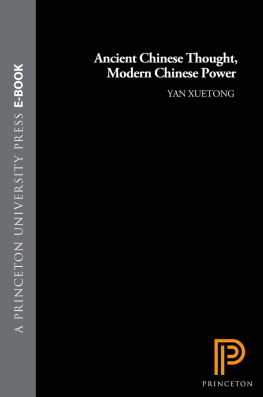


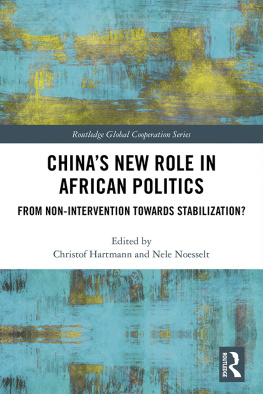
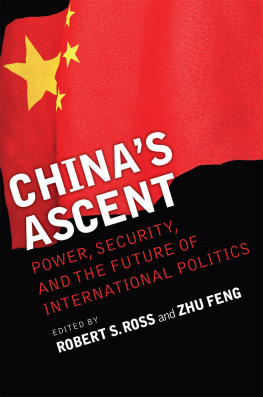
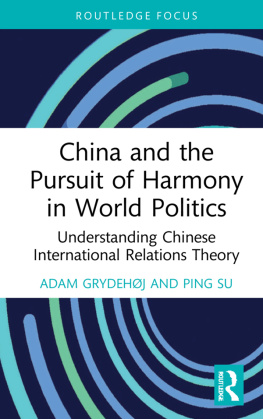
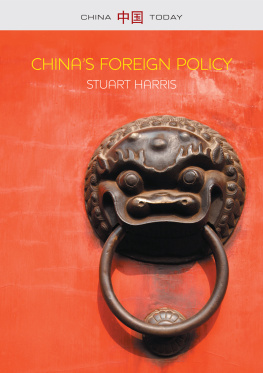

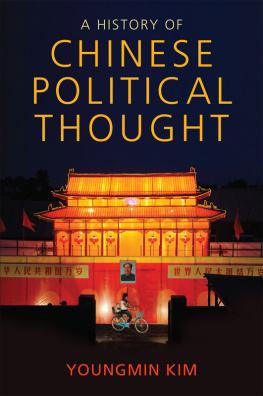
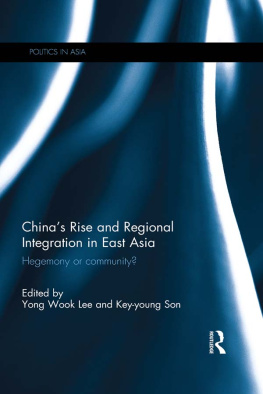

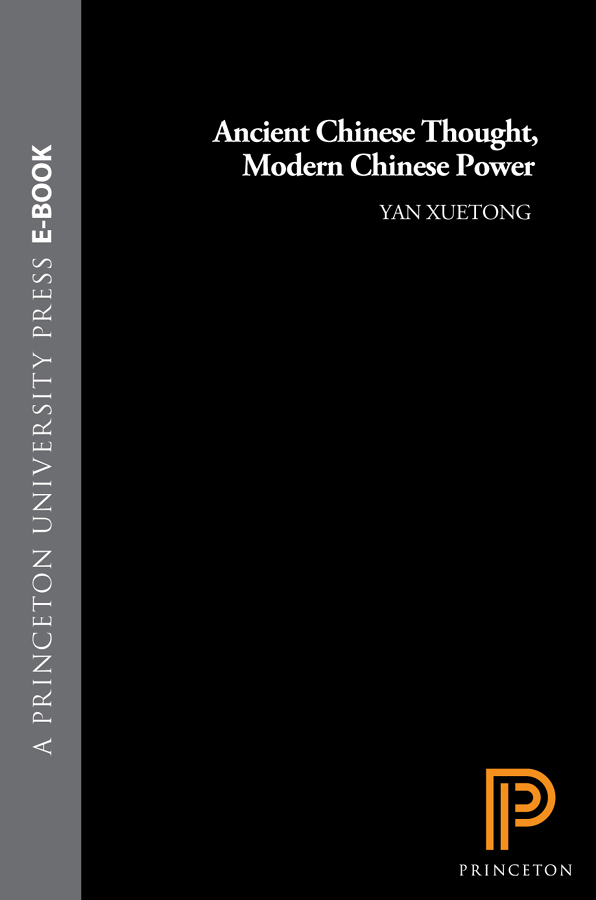


 Ancient Chinese Thought, Modern Chinese Power
Ancient Chinese Thought, Modern Chinese Power (wang)the political ideal of pre-Qin thinkers that contrasts with
(wang)the political ideal of pre-Qin thinkers that contrasts with  (ba, hegemony) was translated as humane authority rather than the more common sage king. Obviously, Yan is not arguing for the reestablishment of a monarchical system led by one sage who would save the world with his moral goodness.
(ba, hegemony) was translated as humane authority rather than the more common sage king. Obviously, Yan is not arguing for the reestablishment of a monarchical system led by one sage who would save the world with his moral goodness.